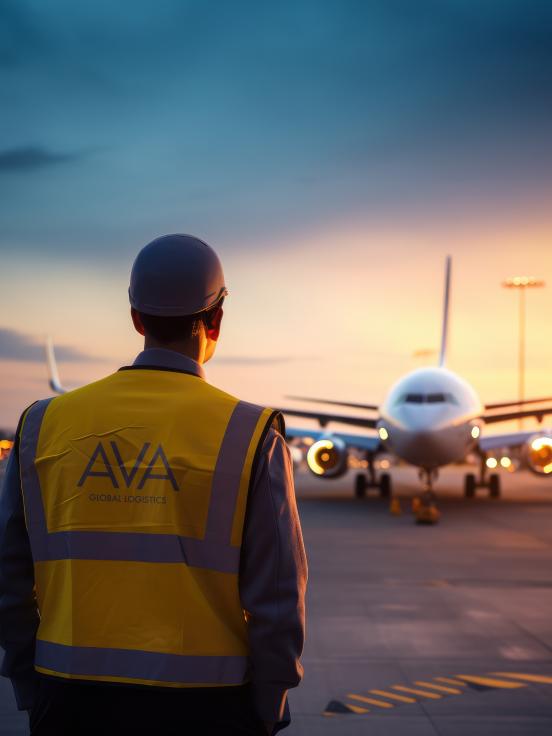
Secure Logistics in 2025: Emerging Trends for Safeguarding High-Value Assets
Year-end is a critical time for the logistics sector as companies manage increased demand whilst navigating the unique challenges of the holiday season.
The end of the year is always a time of opportunity and risk for logistic and supply chain companies as consumers and suppliers are driven by the urgency of the season. In recent years, this urgency has been heightened by the continued, and increasing, switch from stores to eCommerce, and by events such as Black Friday and Cyber Monday. Whilst commerce businesses attempt to deliver seamless shopping experiences and speedy delivery for their customers, logistics and transportation companies must work hard to keep the supply chain stable.
As the gold-standard in precious cargo logistics, Ava approaches the holiday season with the same tenacity and attention to detail that we do throughout the year, whilst considering the additional and unique challenges of the season!
Secure Logistics in 2025: Emerging Trends for Safeguarding High-Value Assets
The international logistics industry is at a crossroads. Groundbreaking advancements in technology, evolving customer expectations, and the challenges of political and environmental dynamics are reshaping the landscape of the sector. Companies must adapt to thrive, balancing innovation with resilience in the face of global changes.
In this blog, we explore how these trends are driving change, and highlight how Ava is leading the way, delivering smarter, more personalised and sustainable logistics solutions for years to come.
Technology Trends
Technology trends for the high-value logistics industry in 2025 will be driven by two key needs: personalised service and advanced cybersecurity.
Companies are increasingly leveraging cutting-edge tools like AI, blockchain, and biometric security to address these needs, while streamlining operations.
Platform Integration
In 2025, platform integration is likely to be a key focus for logistics companies as they strive to improve their customer service. Having multiple systems can lead to inefficiencies and increased error rates. Consolidating systems into one secure platform – utilised by both the business and the client – means that everyone is able to benefit from faster and simpler processes.
Ava's Customer Experience Platform was designed to anticipate and respond to this need.
Our platform streamlines bookings, inventory management, route optimisation and analytics. It includes status updates, documentation storage, accounting systems and CO2 emissions tracking. Integration into one easy-to-use platform helps to reduce costs and develop sustainable practices as data-driven decision making becomes easier than ever.
Cybersecurity
Cybercriminals are constantly employing more and more sophisticated strategies; whether for phishing attacks, installing ransomware or orchestrating data breaches. Logistics companies must work hard to stay ahead and protect themselves. Therefore, improving cyber resilience is a key trend for the logistics industry as we look to 2025. Platform integration, AI and blockchain will all play a part in achieving better resilience.
Artificial Intelligence (AI)
AI is an incredible tool which companies will find essential for upgrading their services in 2025 and beyond.
The most essential AI capabilities for logistics include:
- Risk prediction
- Route optimisation
- Real-time monitoring
- Automated inventory tracking using AI cameras
- Predicting disruptions
- Inventory forecasting
- Demand forecasting
- Predictive maintenance
While AI offers incredible opportunities for improving efficiency and customer service, it also poses risks, particularly in the realm of cybersecurity. Malicious actors can exploit AI to automate attacks or identify system vulnerabilities faster than ever. As logistics companies embrace AI, robust safeguards must be in place to mitigate such risks and ensure that the technology is used responsibly and securely.
Biometric security
Biometric security is transforming global logistics by enhancing access control, ensuring only authorised personnel are allowed to handle high-value shipments. Mobile biometric scanners streamline identity verification during transit and at critical points such as customs checkpoints, reducing delays while maintaining robust security.
By automating such processes, logistics companies can both improve efficiency and meet stringent compliance standards, providing an advanced level of protection that builds trust with their clients while handling their precious cargo.
Blockchain
Blockchain technology is enhancing transparency, security and efficiency. Information is recorded in blocks; when a new dataset is added, it forms a new block and automatically works together with the previous block.
Blockchain technology ensures integrity of records and keeps transactions secure: its decentralised ledger provides a tamper-proof record of every transaction, reducing fraud and ensuring accountability across the supply chain. ‘Smart contracts’ automate critical processes like customs clearance and payments, reducing manual paperwork and speeding up cross-border operations. With real-time tracking and end-to-end visibility, blockchain enables precise monitoring of shipments, improving trust and reducing delays.
By cutting operational costs and streamlining documentation, blockchain technology not only boosts efficiency but also strengthens the resilience of global supply chains in an ever-changing landscape.
Sustainability
As the world works towards a sustainable future, cleaner methods of transportation have never been more important.
Logistics companies can expect to see a restructuring of the sector as everyone integrates new sustainable technologies such as electric vehicles and emissions tracking into their businesses. We are striving to add more EV fleets into our partner network, continuing to enhance the sustainability of our supply chain, and we will watch the evolution of ‘Jet Zero’ with interest, where the aviation industry is striving to become carbon neutral by 2050.
Ava's CO2 emissions tracking page on the Customer Experience Portal supports companies in satisfying the Corporate Sustainability Reporting Directive and the SEC Climate Disclosure Rule by accurately reporting their CO2 emissions.
The Platform offers data on a per-shipment basis. Historic, current and future shipment data can be viewed and the collective information broken down however needed and presented in the clearest format, using colour-coded, easy-to-interpret graphs and bar charts.
Political Instability
In 2024, global conflicts had challenging effects on international logistics. This is set to continue into 2025 with uncertainty surrounding the potential policies of the incumbent US President and ongoing conflicts in Europe and the Middle East. Organisations must be flexible and adjust to an evolving political climate.
Political instability makes it more essential than ever that we have trustworthy local partners we can rely on in every country where we operate. That local knowledge is incredibly valuable. Ava's asset-free structure gives us the freedom to work with the best partners for our clients, and our in-person auditing system ensures that our partners are dependable.
Regulations & Compliance
In recent years there has been an expansion in regulations, compliance rules and privacy laws that must be met by all international logistics industries, so it’s no surprise that adhering to regulations and satisfying compliance is an important trend in itself.
Meeting the required standards across various continents can be a minefield, but adherence is essential for efficient service. Ava’s dedicated Account Managers are always on hand to help our clients navigate these intricacies throughout the shipment journey.
Conclusion
In 2025, the international logistics sector will continue to be driven by technological innovation, sustainability imperatives, and the need for resilience amid global challenges. Companies that embrace these trends and adapt their business models to meet them will be well-positioned to lead in efficiency, reliability and customer satisfaction.
We believe that offering a personalised service, promoting sustainable practices, and understanding the complexities of regulatory compliance are key. These factors are shaping the future, so businesses must be agile and proactive.
Ava is proud to be at the forefront of these advancements, delivering solutions that empower our clients to navigate the complexities of tomorrow’s logistics landscape with confidence.
Ava strives to be ahead of the curve, offering unparalleled security through high-risk zones to deliver you peace of mind. We cover six continents, with regional offices in New York, Miami, Buenos Aires, London, Frankfurt, Dubai, Hong Kong, Perth and Mumbai. Get in touch with your local expert to learn more about why Ava is the home of secure global logistics.





